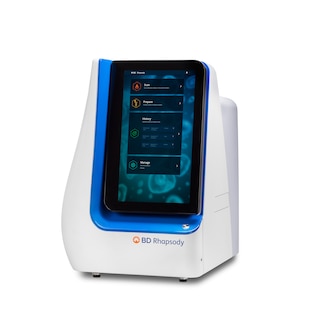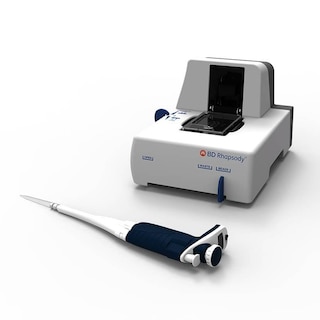-
Your selected country is
Middle East / Africa
- Change country/language
Old Browser
This page has been recently translated and is available in French now.
Looks like you're visiting us from {countryName}.
Would you like to stay on the current country site or be switched to your country?


Oligo Rat Anti-Mouse CD278
Regulatory Status Legend
Any use of products other than the permitted use without the express written authorization of Becton, Dickinson and Company is strictly prohibited.
Preparation And Storage
Recommended Assay Procedures
Put all BD® AbSeq Reagents to be pooled into a Latch Rack for 500 µL Tubes (Thermo Fisher Scientific Cat. No. 4900). Arrange the tubes so that they can be easily uncapped and re-capped with an 8-Channel Screw Cap Tube Capper (Thermo Fisher Scientific Cat. No. 4105MAT) and the reagents aliquoted with a multi-channel pipette.
BD® AbSeq tubes should be centrifuged for ≥ 30 seconds at 400 × g to ensure removal of any content in the cap/tube threads prior to the first opening.
Product Notices
- This reagent has been pre-diluted for use at the recommended volume per test. Typical use is 2 µl for 1 × 10^6 cells in a 200-µl staining reaction.
- The production process underwent stringent testing and validation to assure that it generates a high-quality conjugate with consistent performance and specific binding activity. However, verification testing has not been performed on all conjugate lots.
- Please refer to bd.com/genomics-resources for technical protocols.
- Caution: Sodium azide yields highly toxic hydrazoic acid under acidic conditions. Dilute azide compounds in running water before discarding to avoid accumulation of potentially explosive deposits in plumbing.
- Source of all serum proteins is from USDA inspected abattoirs located in the United States.
- Illumina is a trademark of Illumina, Inc.
- Please refer to http://regdocs.bd.com to access safety data sheets (SDS).
- For U.S. patents that may apply, see bd.com/patents.
Companion Products






The 7E.17G9 monoclonal antibody specifically binds to CD278, the Inducible Costimulatory molecule (ICOS), a 47-57 kDa homodimeric glycoprotein of the CD28 family of costimulatory molecules. ICOS is expressed on subpopulations of CD4-CD8- and CD4+CD8- (but not CD4-CD8+ or CD4+CD8+) thymocytes, on some T-cell lines, and on small numbers of peripheral leukocytes. It is upregulated on T lymphocytes following activation via the T-cell receptor. The T-cell activation marker H4 is the same molecule as ICOS. ICOS is a costimulatory receptor, and its ligand on antigen-presenting cells has been called B7RP-1, GL50, B7h, B7-H2, or LICOS. There is considerable evidence that the interaction of ICOS with its ligand is involved in the regulation of many, but not all, T-cell-mediated immune responses.
Development References (8)
-
Buonfiglio D, Bragardo M, Redoglia V, et al. The T cell activation molecule H4 and the CD28-like molecule ICOS are identical. Eur J Immunol. 2000; 30(12):3463-3467. (Biology). View Reference
-
Chambers CA. The expanding world of co-stimulation: the two-signal model revisited. Trends Immunol. 2001; 22(4):217-223. (Biology). View Reference
-
Dong C, Temann UA, Flavell RA. Cutting edge: critical role of inducible costimulator in germinal center reactions. J Immunol. 2001; 166(6):3659-3662. (Biology). View Reference
-
Mages HW, Hutloff A, Heuck C, et al. Molecular cloning and characterization of murine ICOS and identification of B7h as ICOS ligand. Eur J Immunol. 2000; 30(4):1040-1047. (Biology). View Reference
-
McAdam AJ, Chang TT, Lumelsky AE, et al. Mouse inducible costimulatory molecule (ICOS) expression is enhanced by CD28 costimulation and regulates differentiation of CD4+ T cells.. J Immunol. 2000; 165(9):5035-40. (Immunogen: ELISA, Flow cytometry). View Reference
-
Schwartz RH. Immunology. It takes more than two to tango. Nature. 2001; 409(6816):31-32. (Biology). View Reference
-
Sperling AI, Bluestone JA. ICOS costimulation: It's not just for TH2 cells anymore. Nat Immunol. 2001; 2(7):573-574. (Biology). View Reference
-
Wallin JJ, Liang L, Bakardjiev A, Sha WC. Enhancement of CD8+ T cell responses by ICOS/B7h costimulation. J Immunol. 2001; 167(1):132-139. (Biology). View Reference
Please refer to Support Documents for Quality Certificates
Global - Refer to manufacturer's instructions for use and related User Manuals and Technical data sheets before using this products as described
Comparisons, where applicable, are made against older BD Technology, manual methods or are general performance claims. Comparisons are not made against non-BD technologies, unless otherwise noted.
For Research Use Only. Not for use in diagnostic or therapeutic procedures.
Report a Site Issue
This form is intended to help us improve our website experience. For other support, please visit our Contact Us page.